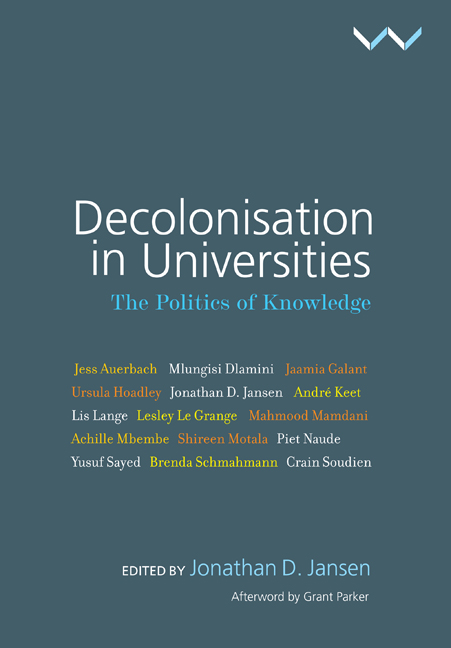Book contents
- Frontmatter
- Contents
- List of Figures
- Acronyms and Abbreviations
- Introduction and Overview: Making Sense of Decolonisation in Universities
- PART 1 THE ARGUMENTS FOR DECOLONISATION
- PART 2 THE POLITICS AND PROBLEMS OF DECOLONISATION
- Chapter 3 On the Politics of Decolonisation: Knowledge, Authority and the Settled Curriculum
- Chapter 4 The Institutional Curriculum, Pedagogy and the Decolonisation of the South African University
- Chapter 5 What Counts and Who Belongs? Current Debates in Decolonising the Curriculum
- PART 3 DOING DECOLONISATION
- PART 4 REIMAGING COLONIAL INHERITANCES
- Afterword: Decolonising Minds via Curricula?
- Contributors
- Index
Chapter 4 - The Institutional Curriculum, Pedagogy and the Decolonisation of the South African University
from PART 2 - THE POLITICS AND PROBLEMS OF DECOLONISATION
Published online by Cambridge University Press: 25 October 2019
- Frontmatter
- Contents
- List of Figures
- Acronyms and Abbreviations
- Introduction and Overview: Making Sense of Decolonisation in Universities
- PART 1 THE ARGUMENTS FOR DECOLONISATION
- PART 2 THE POLITICS AND PROBLEMS OF DECOLONISATION
- Chapter 3 On the Politics of Decolonisation: Knowledge, Authority and the Settled Curriculum
- Chapter 4 The Institutional Curriculum, Pedagogy and the Decolonisation of the South African University
- Chapter 5 What Counts and Who Belongs? Current Debates in Decolonising the Curriculum
- PART 3 DOING DECOLONISATION
- PART 4 REIMAGING COLONIAL INHERITANCES
- Afterword: Decolonising Minds via Curricula?
- Contributors
- Index
Summary
Of all the imagery that accompanied the student protest in the period 2015–2017, a photograph of a black woman student during the #RhodesMustFall (#RMF) moment holding a placard with the inscription ‘Look at me, I am here’, constitutes for me one of the most revealing statements of the issues that the protest movement attempted to address.
‘Look at me, I am here’ is a call for recognition and acknowledgement that encompasses the physical, socio-cultural, economic, and curricular aspects of life at historically white South African universities (HWUs). This chapter engages with the theme of this book, the politics of curriculum, using the concepts of recognition and misrecognition (Honneth 1995; Fraser and Honneth 2003) implicit in the demand ‘Look at me, I am here’, to explore the ‘problem’ of black students’ identity at HWUs and its relationship with the meanings of the decolonisation of the curriculum.
LOCALISATION AND CONTEXT
Before I start to develop my argument, I think it is important to situate the place from where I am writing. In the last eight years I have been part of the executive of two very different historically white universities, the University of the Free State (UFS) from 2011 to 2017 and the University of Cape Town (UCT) since 2018, holding the portfolio on teaching and learning. From Bloemfontein I watched #RMF unfolding, hoping it would ignite a similar conversation at UFS. It did not happen. By the time the protest reached UFS the idea of free, decolonised, quality education was squarely focused on the struggle for free education and indirectly on the insourcing of workers, but curriculum and definitions of quality were not a central piece of the protest. At UFS, decolonised, quality education was a political slogan that had little real traction in the debate or even in the protest. What students at UFS retained in their protest was the critique of the pervasiveness of a white Afrikaans university culture they saw embodied in the events that took place at the Shimla Park Stadium in February 2016.
- Type
- Chapter
- Information
- Decolonisation in UniversitiesThe Politics of Knowledge, pp. 79 - 99Publisher: Wits University PressPrint publication year: 2019



